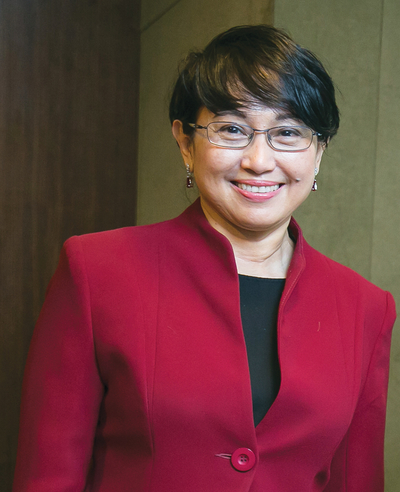
With mature digital connectivity and capabilities, Malaysia’s digital economy continues to grow in strength.
Over the years, MSC Malaysia Status Companies have seen a rise in terms of revenue, investment, exports and jobs.The total number of MSC Malaysia Status Companies have increased to a total of 3,287 as of now, which is a clear indication that Malaysia’s digital landscape is flourishing.

YBhg. Datuk Yasmin Mahmood, Chief Executive Officer of MDEC.
Over the years, Malaysia Digital Economy Corporation (MDEC) has been creating a vibrant digital economy that attracts both talent and investments. This comes as emerging technologies are now being integrated into all aspects of life and how businesses are run. Datuk Yasmin Mahmood, its Chief Executive Officer, believes that there are vast opportunities in this area, and many strategies have been implemented to leverage on these changes.
A Strong Foundation
MDEC continues to create initiatives surrounding its four key pillars, namely driving investments, building local tech champions, catalysing digital innovation ecosystems, and propagating digital inclusivity.
Malaysia has consistently maintained itsthird place ranking globally as a preferred Global Business Services (GBS)location since 2004, according to AT Kearney’s Global Services Location Index.This has paved the way for a high degree of ICT investment, which then led to a strategic shift to take place, moving towards new emerging digital technologies and services.
“In line with the shift, the digital economy of today is highly focused on areas that include cloud and data centres, IoT, BDA and AI, Ecommerce, Fintech and cybersecurity. In fact, these are also the digital services that Malaysia is looking into. Therefore, we at MDEC, will continue to maintain a close engagement with existing investors to move into higher value activities in these areas. One clear indication is that the focus of investment has also evolved towards targeting specific countries,industries and activities.
“Furthermore, we are also looking to attract startups and scale-ups to set up in the country, as we realise their importance in developing a successful digital economy. This comes as Malaysia presents the perfect platform and ecosystem to fuel their growth,” said Yasmin.
To support the growth of Malaysia’s digital economy, MDEC has been assisting MSC Malaysia Status Companies through programmes that connect them to partners and customers. These companies in turn, provide a range of high-skilled jobs for Malaysians and contribute towards the development of the tech industry.
“We are especially proud of two successful platform initiatives that we have released. One of which is the Global Acceleration and Innovation Network (GAIN) programme, which we created for scale-up companies, whilst the TITAN programme was conceived as a springboard for startups to expand and grow,” said Yasmin.
Through both programmes, MDEC intends to increase companies’ revenues, exports, and connect them to the global market ecosystem and further enhance investment opportunities in the country.
Catalyst For Growth
MDEC also acts as a catalyst in innovating growth strategies to enhance various ecosystems, namely talent, e-commerce and emerging technologies such as Big Data, IoT and AI. By aiding companies to forge strong partnerships with key industry and agencies, innovative strategies have been conceptualised to meet digital disruption across different sectors.
According to Yasmin, the talent ecosystem is one that needs to be nurtured well in order to prepare the future generations of Malaysians for high value digital economy opportunities.
Together with the Ministry of Education and various academic institutions, MDEC launched the #mydigitalmaker Movement in 2016 that strives to groom young Malaysians to become future digital innovators.
Yasmin also highlighted another programme –Digital Ninja – which is focused on identifying the top digital innovators from secondary schools to be groomed by MDEC.
Identified as a new source of growth for Malaysia, Big Data Analytics has now taken the centre stage, as seen by the development of the National Big Data Analytics Framework in 2014. The framework later expanded to cover the areas of IoT and AI as well.
“In order to close the gap between the supply and ever increasing demand for data scientists, MDEC – together with ADAX (ASEAN Data Analytics eXchange) – aims to produce 20,000 data professionals, including 2,000 data scientists, by 2020. To do so, we initiated four strategic approaches consisting of training partners, online training,talent placement in the marketplace and talent harvesting through universities,” she said.
As an added initiative towards future-proofing Malaysian companies to thrive in the digital economy, MDEC has collaborated with Malaysian Investment Development Authority (MIDA) and launched the Digital Transformation Acceleration Programme (DTAP) early this year.
“When we launched DTAP, it was with the intention of helping mid-tier companies embark on their digital transformation journey via structured programmes to not just improve their productivity, but also open up new sources of growth and a reduced dependency on foreign labour.”
Besides a strong e-commerce platform,Malaysia’s digital economy sphere has a vibrant Startup ecosystem filled with next-gen companies that will bring impact to the tech industry and future job creation.
According to Yasmin, MDEC has enriched the ecosystem through initiatives such as the Malaysia Digital Hub. “We first identify and certify incubators that are ‘breeding’ these startups. Then,startups are given a support system via ecosystem connections such as entrepreneurship and accelerator programmes, and engagement with venture capitals, whilst developing their critical digital skills and benefiting from market access opportunities.’
Furthermore, MDEC has also partnered with the Immigration Department to introduce the Malaysia Tech Entrepreneurs Programme in the pursuit of attracting global skilled talents.
Leading the charge on digital inclusivity across all communities, MDEC launched the eUsahawan and eRezeki initiatives.
The eUsahawan venture is a digital entrepreneurship programme aimed at mainstreaming digital entrepreneurshipeducation amongst emerging and current micro-entrepreneurs via a community-centric approach. This programme was then deployed at all major public Technical Vocational Education Training (TVET) colleges.
“On the success of the eUsahawan venture,we plan on developing an online platform to build an eCommerce ecosystem.Through this, the platform is able to profile clients and connect them to relevant courses, compliance-related certification and services,” explained the MDEC CEO.
The eRezeki venture on the other hand is a programme for Malaysians – especially the B40 community (Malaysian households earning RM3,900 a month or less) – to earn supplemental income through crowd sourcing. The programme was further expanded to benefit the M40(households with income ranging from RM3,860 to RM8,319) via the Global Online Workforce (GLOW) Programme that was initiated in the first quarter of 2018.
GBS Driving Higher Value Towards Digital Services
acing the age of disruption, the GBS industry remains as an engine of transformation to help companies manoeuvre through uncertainties. The ecosystem can benefit from capitalising new and emerging technologies such as Machine Learning, Big Data Analytics, and numerous digital services.
Maturity in this aspect will assist a company’s business model beyond not just cost savings, but also spur collaboration across the numerous functional verticals. Furthermore, by rethinking operations and leveraging on insightful data, companies are able to function more efficiently and at higher speeds.
The current all-embracing digital agenda is conducive in spurring high value global services activities in the country –paving the way for the setup of more GBS outfits, Centres of Excellence, Remote Operation Centres and Technological Hubs.

MDEC also acts as a catalyst in innovating growth strategies to enhance various ecosystems, namely talent,e-commerce and emerging technologies such as Big Data, IoT and AI.
The Future Awaits
With the four pillars as the foundation,MDEC plans to continue driving the development of the digital economy through high impact initiatives as well as periodical assessments on these initiatives to stay relevant with global and technological trends.
Clearly, the appetite for digital adoption is steadily on the rise in Malaysia. This is reflected through the surging number of foreign investors into the Malaysian market. Tech companies are setting up their global and regional hub here as springboard into other Asia Pacific countries.
“To analyse our progress, our benchmarks include the likes of Digital India and Germany Industrie 4.0, both of which are global initiatives related to the Fourth Industrial Revolution. The digital economy landscape is constantly shifting, and we intend on staying at the helm of innovation and digitalisation across all sectors. In addition, we also believe that GBS, running in tandem with the Fourth Industrial Revolution, will lead to a robust digital landscape in Malaysia,” Yasmin concludes.


